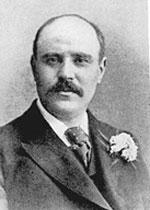Gunsberg Isidor Arthur (02.11.1854 – 02.05.1930)
 English Grandmaster born in Hungary. One of the strongest chess players and journalists at the end of 19th century, he was also a challenger for world title.
English Grandmaster born in Hungary. One of the strongest chess players and journalists at the end of 19th century, he was also a challenger for world title.
Gunsberg came from a Hungarian Jewish family, who immigrated in 1863 to England. Since 1876 lived in England, London -world chess centre at that time where he could easily develop his chess skills. He started to play chess professionally at the age of 25. In 1881 he played a match against Joseph Blackburne which he lost.
During his chess career, he took part in numerous international tournaments and in 1885 won a tournament at London and at Hamburg. Twice he participated in the London tournaments: in 1886 where he shared 3-4 places and 1887 was equal 1st. In 1886 he beat Joseph Blackburne scored +5=6-2 and defeated Henri Bird with a score +5=3-1. The same year he shared 3-4 places at Nottingham. In 1887 at London he was equal 1st with Henri Burn, followed by Joseph Blackburne and Herman Zukertort. That year he played a match with Joseph Blackburne which ended with a score +5-2=6. He acted the 1st in 1888 at Bradford and London. In 1889 at New York he came 3rd and shared 4-7 places at Breslau. In 1890 at Manchester he took the 5th place. That year he met with Mikhail Chigorin playing a match at Havana which ended with a draw 11½-11½. His successes gave him the right in 1890 to challenged Wilhelm Steinitz to play title-match. The match took place in New York and lasted for seven weeks but finally Gunsberg lost the event scoring only 8½-10½.
In the period 1883-1914, he participated in 28 chess events, seven of which he won and tied for 2-4th places nine times.
Gunsberg was the master of positional style and belonged to the chess players, “who were capable to create more masterful plans of defence than attacks”, as Mikhail Chigorin said, but he was skillful in attacking play when it was necessary. Parallel to playing chess he took some other activities.
He was an editor of numerous chess columns (The Daily Telegraph for thirty years), he also composed problems and in 1915 he published 104 of his problems in The Daily Telegraph.
He is known to be the organizer of the famous five-stage 36-player tournament at Ostend, Belgium in 1906.



